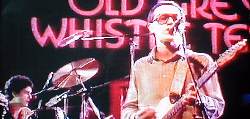These albums were not at all bad, and they sold quite
well - especially BTTB whose first 1,000 came out on clear/white vinyl.
Producer James Guthrie (who graduated to the Floyd) got it right.
The band finally got some sort of public recognition,
due to the travelling, the higher-profile gigs, the radio and press interviews
everywhere and TV appearances, locally and on the Old Grey Whistle Test
(three times, twice with Whispering Bob Harris, once with Anne Nightingale).
Bands played live on TV in those days. They were no richer, but they were
better known.
This was a time to be Punk or Not. The Movies were usually
considered Not. Because they could play, and they could play at jazz clubs
like Scott's night after night, and they could string words together,
and they didn't make a sort of grinding noise. In Norway, though, their
sounds were immediately labelled Punk, and when they appeared on TV in
Tromso they were hailed as the first British punk band to appear on Norwegian
TV. The irony.
The Movies (though some had art-school tendencies) were
not Punk. They weren't even human. They may have lived in flats and houses
in the south and south-west of London, but their home was beyond Space.
This is made perfectly clear in numerous songs. I won't bother to mention
'Hello from Outer Space', which is on the final album. That was made in
America where the truth had to be spelled out clearly. Even before that
the message was clear: our rules are not of this earth.
Jamie, the drummer. Good-looking chap. What do they do
with him? Stick him right at the back, invisible. Daft! They should have
played with the drums in front. Unless ...
Jon, lived like a monk (except in Copenhagen), dry as
dust, used to lecture in all kinds of boring subjects. Academic, dull,
except in Copenhagen. The rest of them, witty, amusing. Who does the interviews?
Jon. Incredible! Unless ...
What made The Movies special is their lack of speciality.
They could go anywhere and talk to anyone. If they arrived at the BBC,
they would talk the doorman's language, then the receptionist's, then
the studio manager's, and then the Chief Executive's. They had the manner
of every class of human being stored in some internal database. But for
themselves, they were - in the words of one of their songs - 'No Class'.
I followed them down a BBC hallway, and heard their accents, even their
personalities, change according to whom they met on the way. This was
not the behaviour of human beings, but of the mirror-men of Planet Tharg.
As for politics, their rejection of barriers, of class,
and of gentlemen's clubs (viz 'Big Boys Band') might have endeared them
to the far-Left, but it didn't, because the far-Left believed then that
anyone in the Music Business must be deeply fascist. And the far-Right
didn't like them because they rejected barriers, class, and gentlemen's
clubs. And everyone in the middle was quite happy with Punk (whose words
they couldn't hear) or Not Punk (whose words were blissfully untroubling).
No wonder The Movies never made a bean!
But they had a devoted following, dotted across the globe.
Dundee was a hotspot. And Bath, well I think that was the only time I
came across an audience weirder than the band. Even in New York. And you
know you've got somewhere when the audience mouths the words back at you.
That's frightening. You really don't want to get it wrong when there's
hundreds of people lurching in front mouthing words in time: if you get
it wrong, they'll lose sync and start crashing about.
But enough of this high life. With the departure from
the band of keyboards and then of founder-member Jamie, the survivors
were forced into a rapid re-think. It was time to investigate America.





